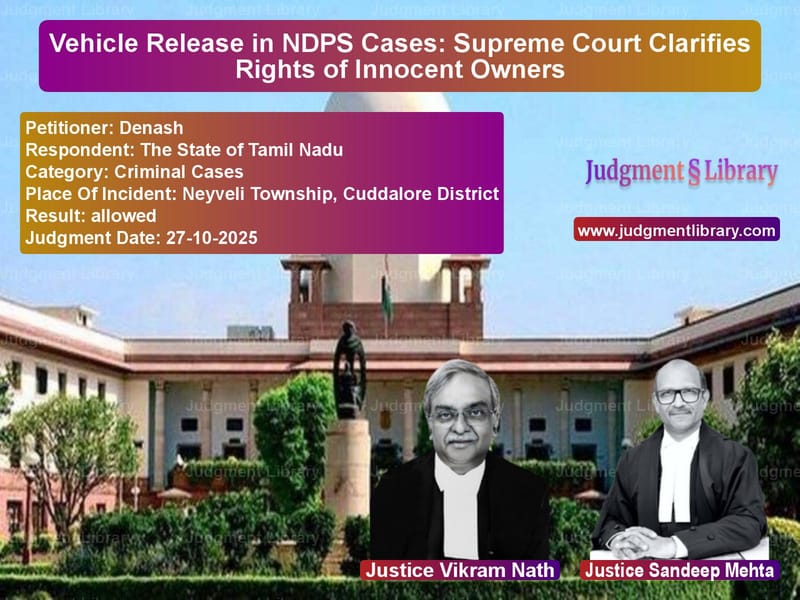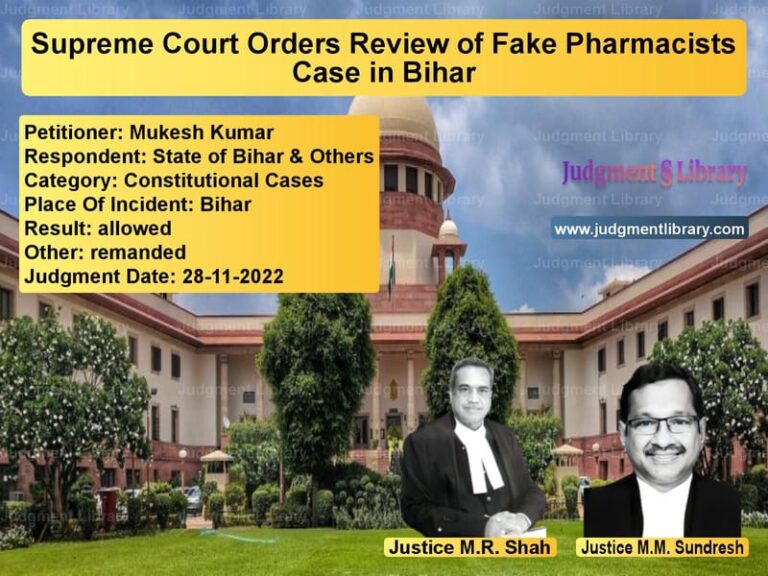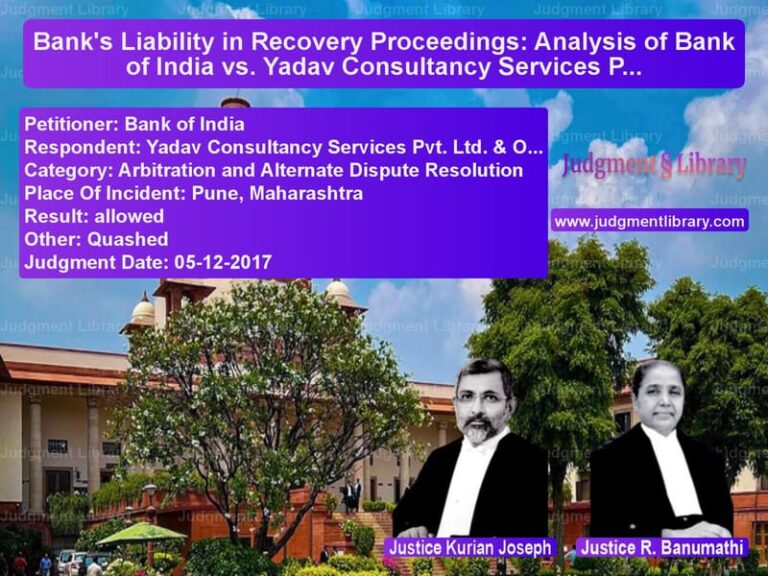Vehicle Release in NDPS Cases: Supreme Court Clarifies Rights of Innocent Owners
In a landmark judgment that brings relief to countless vehicle owners across India, the Supreme Court has clarified the legal position regarding the release of vehicles seized under the Narcotic Drugs and Psychotropic Substances (NDPS) Act. The case involved Denash, a transport vehicle owner whose lorry was seized when police found 6 kilograms of ganja concealed in it during a routine check. What makes this case particularly significant is that Denash was not charged with any offense – the drugs were found in possession of the drivers and cleaners he had hired, yet his valuable vehicle remained impounded for months, threatening his livelihood and business.
The Supreme Court’s judgment, delivered by Justices Vikram Nath and Sandeep Mehta on October 27, 2025, addresses a crucial question that has troubled vehicle owners and lower courts alike: Can vehicles seized under the NDPS Act be released during the pendency of trial, or must owners wait indefinitely until the case concludes, potentially facing financial ruin? The Court’s answer provides much-needed clarity and establishes important safeguards for innocent vehicle owners while balancing the stringent requirements of anti-drug legislation.
The Case That Sparked the Clarification
Denash, the appellant, owned a 14-wheeler Ashok Leyland lorry bearing registration TN 52 Q 0315, which was lawfully hired for transporting 29,400 MT of iron sheets from Chhattisgarh to Tamil Nadu. On July 14, 2024, police officers from Neyveli Township intercepted and searched the vehicle during transit. During the search, they discovered 1.5 kilograms of ganja concealed beneath the driver’s seat and an additional 1.5 kilograms each from the personal possession of the other three accused persons present in the vehicle, making the total seized quantity 6 kilograms.
All four persons present in the vehicle were arrested, and FIR No. 220 of 2024 was registered for offenses under Sections 8(c), 20(b)(ii)(B), 25 and 29(1) of the NDPS Act. Importantly, the investigation concluded without naming Denash as an accused in the chargesheet. Despite his non-involvement, his vehicle remained seized, causing significant financial hardship.
Denash approached the Special Court seeking interim release of his vehicle under Section 451 of CrPC (Section 497 BNSS), but his application was dismissed. The Special Court held that vehicles seized under the NDPS Act were not amenable to release as they were liable for confiscation under Section 63 of the Act. The Madras High Court, in its impugned judgment dated December 20, 2024, upheld this view, stating that the newly introduced Narcotic Drugs and Psychotropic Substances (Seizure, Storage, Sampling and Disposal) Rules, 2022 vested exclusive jurisdiction with the Drug Disposal Committee for disposal of seized property, including conveyances.
The Legal Battle and Arguments
Before the Supreme Court, Denash’s counsel relied heavily on the recent decision in Bishwajit Dey v. State of Assam, where the Court had examined various scenarios for interim release of vehicles seized under the NDPS Act. He argued that his case was squarely covered by the principles laid down in that judgment.
The State, however, contended that “the judgment in Bishwajit Dey (supra), did not consider the import of the Rules of 2022 and thus, the ratio thereof must be declared to be per incuriam/sub silentio insofar as the aspect of release of vehicles seized under the NDPS Act is concerned.” The State argued that the 2022 Rules had created a completely new mechanism through the Drug Disposal Committee, which now had exclusive jurisdiction over disposal of seized conveyances.
The Supreme Court’s Groundbreaking Analysis
The Supreme Court began its analysis by examining the 2022 Rules in detail. The Court noted that Rule 17 specifies that only the officer in-charge of a police station or any officer empowered under Section 53 of the NDPS Act can initiate action for disposal, and that too only after receiving the chemical analysis report. Rule 22 provides that the Drug Disposal Committee “can” direct disposal of seized materials including conveyances valued less than Rs. 50 lakhs.
The Court made a crucial observation about the nature of these rules: “Clearly thus, the provision under the said Rule is not mandatory, rather directory and supplemental to the provisions of disposal under the Act.”
The Court then examined the substantive provisions of the NDPS Act, particularly Sections 60 and 63. Section 60(3) specifically provides that any conveyance used in carrying narcotic drugs shall be liable to confiscation “unless the owner of the animal or conveyance proves that it was so used without the knowledge or connivance of the owner himself, his agent, if any, and the person-in-charge of the animal or conveyance and that each of them had taken all reasonable precautions against such use.”
Section 63 sets out the procedure for making confiscations and mandates that “no order of confiscation of an article or thing shall be made until the expiry of one month from the date of seizure, or without hearing any person who may claim any right thereto and the evidence, if any, which he produces in respect of his claim.”
The Court emphasized that “the power to determine whether or not a seized conveyance is liable to confiscation vests in the Special Court constituted under the NDPS Act and not in any administrative or executive authority such as the Drug Disposal Committee.”
Protecting Innocent Owners: The Court’s Reasoning
The Supreme Court provided compelling examples to illustrate why its interpretation was necessary to protect innocent vehicle owners:
“(a) The vehicle owned by one ‘X’ is stolen and thereafter, the thief uses the said conveyance to transport narcotic or psychotropic drug. In such a situation, would it be justified in leaving the innocent owner to undergo the ordeal of moving the Drug Disposal Committee after waiting for the arrival of the chemical examiner’s report, before the vehicle can be released?
(b) Where a bona fide transporter, assigns his transport vehicle to a driver and the said driver, in the process of carrying the consigned goods, collects some narcotic material on the way and is apprehended. In such a situation, would it be justified to leave the owner of transport vehicle to await the chemical examiner’s report and then approach the Drug Disposal Committee for release of the vehicle?”
The Court answered these questions emphatically: “Our answer is in the negative. This can never be the intent of the statute and the interpretation to this effect would defeat the very purpose behind Section 60(3) of the NDPS Act.”
The Court relied on its recent decision in Tarun Kumar Majhi v. State of West Bengal, where it was observed that “It is settled law that the seized vehicles can be confiscated by the Trial Court only on conclusion of the trial when the accused is convicted or acquitted or discharged. Further, even where the Court is of the view that the vehicle is liable for confiscation, it must give an opportunity of hearing to the person who may claim any right to the seized vehicle before passing an order of confiscation.”
Applying the Principles to Denash’s Case
The Court noted that Denash was the true owner of the vehicle with valid documents, the vehicle was lawfully engaged for transportation of valuable iron sheets weighing 29,400 MT, the seized drugs were found in possession of the four chargesheeted accused persons, and most importantly, Denash was not arraigned as an accused and the chargesheet contained no material suggesting his knowledge or connivance.
The Court reasoned: “Having regard to the valuable consignment being transported and the high value of the vehicle, it does not stand to reason that the appellant, being the owner thereof, would knowingly jeopardize his business and property by permitting the transportation of 6 kilograms of Ganja alongside such valuable cargo.”
While technically, Denash’s case fell under the second scenario outlined in Bishwajit Dey (where contraband is recovered from the owner’s agent who is arrayed as an accused), the Court adopted a pragmatic approach: “the application of criminal law cannot be reduced to a rigid or mechanical formula. Each case must be examined in light of its peculiar facts and circumstances.”
The Final Ruling and Its Implications
The Supreme Court concluded: “we have no hesitation in holding that the Rules of 2022 cannot be interpreted as divesting the Special Courts of their jurisdiction to entertain an application for interim custody or release of a seized conveyance under Sections 451 and 457 of CrPC [Sections 497 and 503 of BNSS].”
The Court warned that “Any interpretation to the contrary would lead to anomalous and unjust consequences by depriving a bona fide owner of his property without judicial scrutiny or an opportunity of hearing, an outcome wholly inconsistent with the statutory scheme of the NDPS Act and contrary to the fundamental principles of natural justice.”
Accordingly, the Court set aside the High Court’s judgment and directed that Denash’s vehicle be released on supurdagi (interim custody) on terms and conditions to be imposed by the Special Court.
This judgment represents a significant victory for innocent vehicle owners across India. It establishes that the NDPS Act, while stringent in its approach to drug offenses, contains built-in safeguards to protect those who have no connection with the illegal activities. The Court’s emphasis on natural justice and procedural fairness ensures that vehicle owners are not subjected to indefinite deprivation of their property without due process. The ruling also clarifies that subordinate legislation like the 2022 Rules cannot override the substantive protections available under the parent statute, thus maintaining the delicate balance between enforcement objectives and individual rights.
Petitioner Name: Denash.Respondent Name: The State of Tamil Nadu.Judgment By: Justice Vikram Nath, Justice Sandeep Mehta.Place Of Incident: Neyveli Township, Cuddalore District.Judgment Date: 27-10-2025.Result: allowed.
Don’t miss out on the full details! Download the complete judgment in PDF format below and gain valuable insights instantly!
Download Judgment: denash-vs-the-state-of-tamil-n-supreme-court-of-india-judgment-dated-27-10-2025.pdf
Directly Download Judgment: Directly download this Judgment
See all petitions in Drug Possession Cases
See all petitions in Bail and Anticipatory Bail
See all petitions in Fraud and Forgery
See all petitions in Extortion and Blackmail
See all petitions in Money Laundering Cases
See all petitions in Judgment by Vikram Nath
See all petitions in Judgment by Sandeep Mehta
See all petitions in allowed
See all petitions in supreme court of India judgments October 2025
See all petitions in 2025 judgments
See all posts in Criminal Cases Category
See all allowed petitions in Criminal Cases Category
See all Dismissed petitions in Criminal Cases Category
See all partially allowed petitions in Criminal Cases Category







